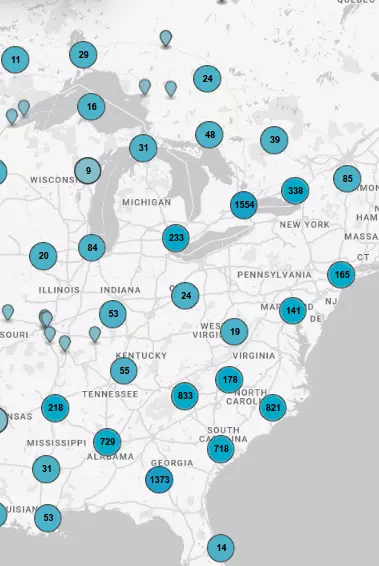Fort Grierson
Approximate location of Ft. Grierson, named after British Lt. Col. James Grierson, who commanded a temporary stronghold at this place during occupation of Augusta by the British under Col. Brown...
- lat34
The Home of Charles Jones Jenkins, Jr., LL.D.
After rendering valuable aid to his State as a justice of the Georgia Supreme Court (1860 - 1865). Charles Jones Jenkins was elected Governor in 1865. For defying certain reconstruction measures...
- lat34
Montrose: Home of Col. Charles Colcock Jones, Jr.
Col. Jones, the `Macaulay of the South,` was born in Savannah in 1831, the son of Charles Colcok Jones, Sr., D.D. Presbyterian divine. He graduated with distinction from Princeton in 1852 and...
- lat34
Pierce Memorial Methodist Church
One of the early Methodist Churches in this section, Pierce Memorial was first called Rocks Church, then Pierce Chapel for Bishop George F. Pierce, leading Georgia Methodist. The first building...
- lat34
Summerville Cemetery
In this cemetery are buried the following eminent Georgians: JOHN MILLEDGE (1757-1818), Revolutionary officer, Congressman, Governor (1802-1806). He gave the land on which the University of...
- lat34
Birthplace of Augusta Chronicle
On this site August 30, 1785, Greenburg Hughes published Augusta`s first newspaper, the Augusta Gazette, which continued, after he went to Charleston, until September 30, 1786, when John Erdman...
- lat34
Hephzibah Methodist Church
The Brothersville Methodist Church was organized in March 1852 in the community of Brothersville to serve the fifteen families living there. The building completed in 1853, was dedicated in...
- lat34
Home of Richard Henry Wilde
Richard Henry Wilde, one of Georgia`s most gifted sons - poet, scholar. lawyer, statesman. lived in this house from 1825 to 1842. Born in Dublin, Ireland, Spet. 24, 1789, he moved to Augusta...
- lat34
Fort Augusta-Fort Cornwallis-St. Paul's Church
This site selected by fur traders Kennedy O`Brien and Roger de Lacy as a trading post to be nearer the Indians than Savannah Town, (in present Beech Island). To protect them and others,...
- lat34
The Medical College of Georgia
The Medical College of Georgia, oldest school of medicine in Georgia, was incorporated in 1828 as the Medical Academy of Georgia. Of the 23 original board of Trustees, 5 were from the City of...
- lat34
The First Baptist Church
In March 1817, eight men and two women meeting in an Augusta home formed `The Baptist Praying Society of Augusta` - the forerunner of the First Baptist Church. Two months later the society...
- lat34
The Signer's Monument
Dedicated July 4, 1848, in honor of the signers of the Declaration of Independence for Georgia: George Walton, Lyman Hall and Button Gwinnett. The first two lie buried in crypts beneath this...
- lat34
Richmond County
Originally designated as the Parish of St. Paul by the Act creating it in 1758, the name was changed in 1777 to Richmond County in honor of the Duke of Richmond, who, as a member of Parliament,...
- lat34
Twiggs Cemetery
In the cemetery about 300 yards from here are buried Major-General John Twiggs, a hero of the American Revolution, for whom Twiggs County is named, and his son, Major-General David Emanuel Twiggs,...
- lat34
The Augusta Arsenal
For a period of 128 years until its abandonment in 1955, a United States Arsenal was located on a tract comprising approximately 70 acres lying South and West of this spot. An `arsenal at Augusta`...
- lat34
Home of John Forsyth
This house was part of the home of John Forsyth located on this property. As U.S. Minister to Spain, in 1819 Forsyth negotiated the treaty by which Florida was acquired by the United States. He...
- lat34
Confederate Powder Works
Obelisk chimney one-third mile (from here) marks center of Confederate Powder Works which extended two miles along the river and was the principal powder factory in the South during the War....
- lat34
Boyhood Home of Woodrow Wilson
Woodrow Wilson, later to become 27th President of the United States, lived in this Manse of the First Presbyterian Church of which his father, Dr. Joseph R. Wilson, was pastor from 1858 to...
- lat34
The First Academy of Richmond County
One block east on Bay Street was opened as a boy´s classical school on April 12, 1785. Here President George Washington attended examinations in 1791. The buildings housed the• General Assembly...
- lat34
Home of Governor Telfair
Here stood the home of Edward Telfair. He was one of the group of young patriots led by Joseph Habersham, who broke open the British powder magazine at Savannah on May 11, 1775 and carried away...
- lat34
